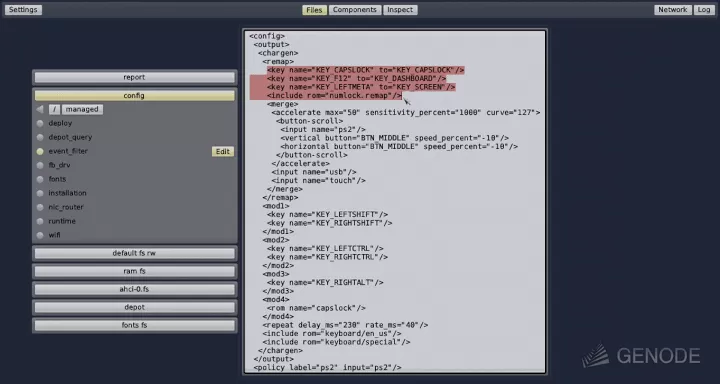Genode OS 22.11 has been officially released.
The Genode Operating System Framework is a toolkit for building highly secure, purpose-built operating systems. It scales from embedded systems with as little as 4MB of memory to highly dynamic general-purpose workloads.
Genode is based on a recursive system structure. Each program runs in a dedicated sandbox and is granted only the access rights and resources it needs for its specific purpose. Programs can create and manage sub-sandboxes with their own resources, forming a hierarchy where policies can be applied at each level. The framework provides mechanisms for programs to communicate with each other and exchange resources, but only in strictly defined ways. Thanks to this strict regime, the attack surface of safety-critical functions can be reduced by orders of magnitude compared to contemporary operating systems.
The framework aligns L4’s construction principles with the Unix philosophy. According to the Unix philosophy, Genode is a collection of small building blocks from which complex systems can be composed. But unlike Unix, these building blocks include not only applications, but all classic operating system functionality, such as kernels, device drivers, file systems, and protocol stacks.
characteristic
CPU architectures: x86 (32 and 64 bit), ARM (32 and 64 bit), RISC-V
Kernels: most members of the L4 family (NOVA, seL4, Fiasco.OC, OKL4 v2.1, L4ka::Pistachio, L4/Fiasco), Linux and custom kernels.
Virtualization: VirtualBox (based on NOVA), custom hypervisors for ARM, and custom runtimes for Unix software
More than 100 ready-to-use components
After porting the latest graphics driver code from Linux, and changing their Intel graphics mux design, they now support Intel Gen12 class graphics with Genode OS 22.11. This is especially good news for Genode’s Sculpt OS general-purpose operating system if you want to enjoy accelerated graphics on the latest generation of Intel hardware.
Genode OS 22.11 also brings more development resources with PinePhone support, virtualization improvements for Arm and x86_64, configurable Intel HWP modes, various device driver improvements, bootloading over HTTP, and other additions.

See Release Notes for details.
#Genode #Released #Open #Source #Operating #System #Framework #News Fast Delivery